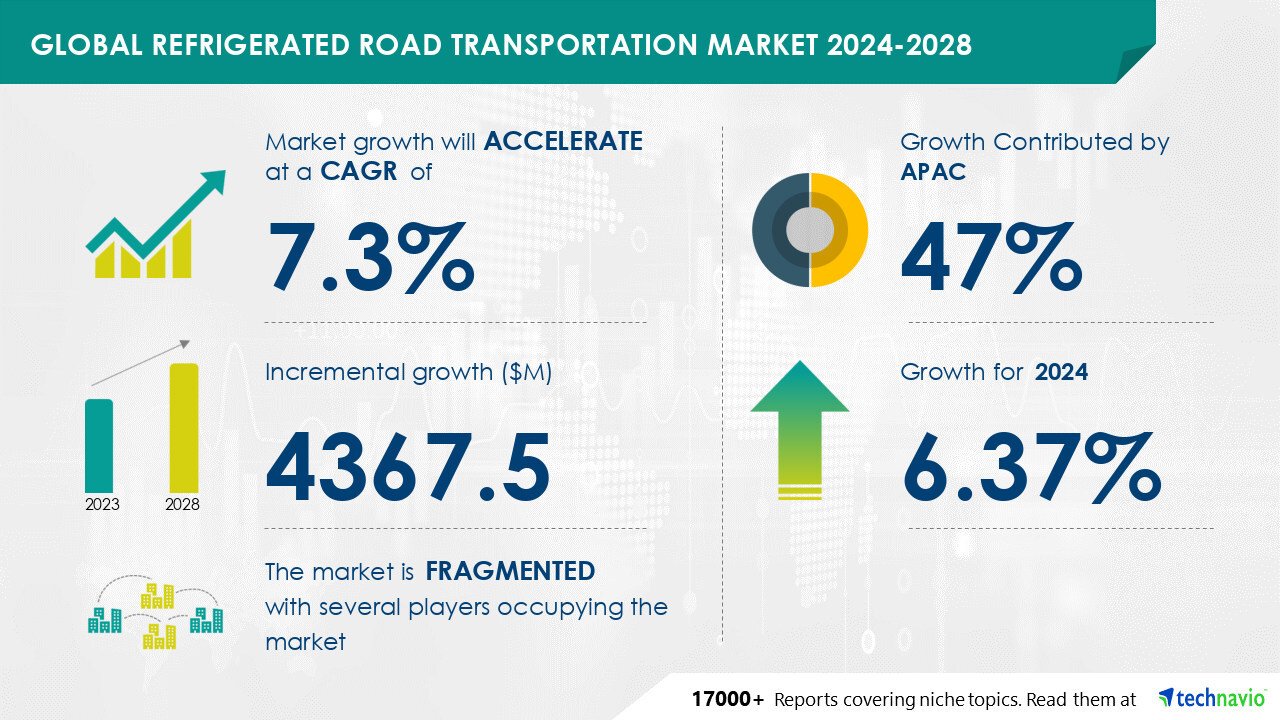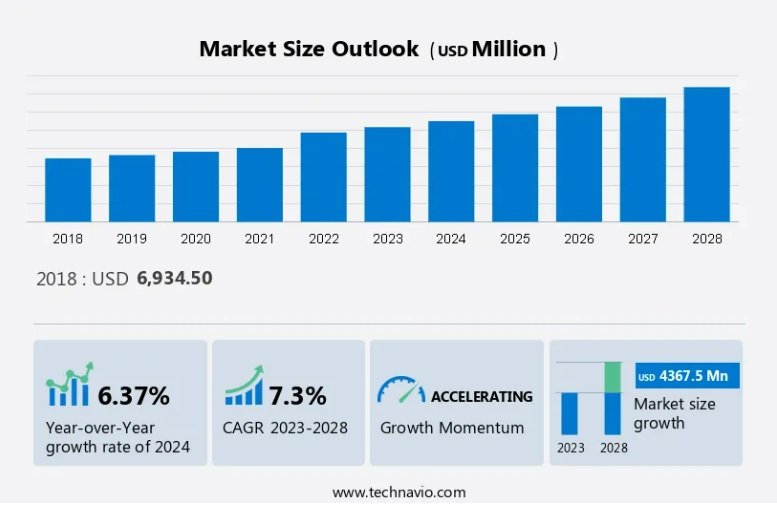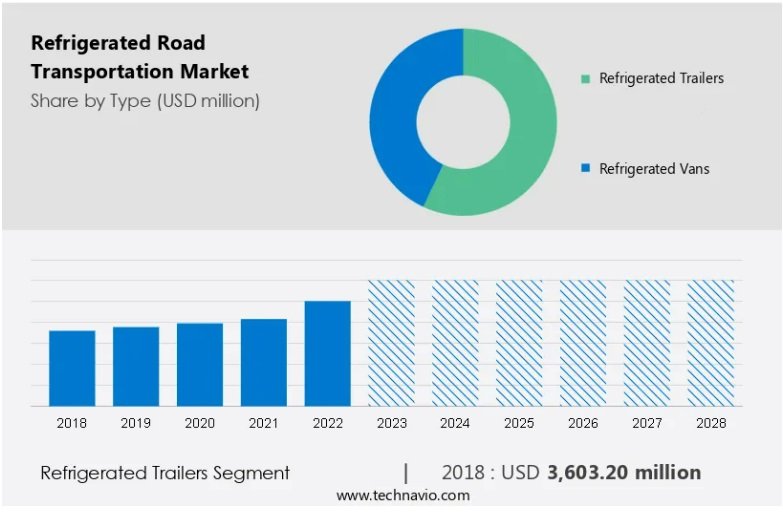Refrigerated Road Transportation Market size is set to grow by USD 4.36 billion from 2024-2028
Market Dynamic and Customer Landscape
The market is witnessing robust growth, driven by the increasing demand for cold chain logistics and the imperative of food safety. With a focus on sustainability and eco-friendly solutions, the industry is actively addressing challenges such as waste reduction and minimizing environmental impact. This sector caters to diverse segments including confectionery, ready-to-eat, and frozen foods, ensuring the integrity of products from food manufacturers to consumers. The adoption of multi-temperature systems and advanced transport refrigeration systems enables precise control over product temperature, crucial for maintaining quality and safety. Both diesel and electric refrigeration trucks play pivotal roles, offering affordability and accessibility while reducing emissions. From fast food chains to pharmaceutical distributors, the refrigerated road transportation market plays a critical role in preserving product integrity and minimizing the loss of food and other perishable items. Our researchers analyzed the market research and growth data with 2023 as the base year, along with the key drivers, trends, and challenges. A holistic analysis of drivers will help companies refine their marketing strategies to gain a competitive advantage.
Key Market Driver
The rising initiatives to promote the cold chain are the key factor driving market growth. The cold chain market in countries such as Brazil, China, India, and South Africa was in the nascent stage during 2005-2015. International regulatory bodies and governments across the world have introduced various regulations that focus on food and drug safety, which promotes the growth of the cold chain.
Many laws and regulations were formulated for strictly controlling and supervising cold-chain pharmaceutical production and management. The above factors are prompting many pharmaceutical manufacturers to shift their focus to the use of cold chain solutions such as refrigerated road transportation for maintaining the purity of their products. Thus the global market in focus is expected to witness high growth during the forecast period.
Significant Market Trend
The advances in refrigerator monitoring systems is the primary trend in the market. A smart refrigerator monitoring system is an intelligent technology that enables users to control their refrigerated cabinets remotely using a smartphone, tablet, or desktop. Traditional refrigerator monitoring systems only allow users to change the temperature or check the status of the refrigerator using the built-in control panel or switch.
However, a smart refrigerator monitoring system gives consumers user-friendly, efficient, and accessible control over traditional refrigerator monitoring systems. This helps in reducing the total turnaround time and prevents companies from incurring huge losses due to unplanned maintenance. Moreover, the benefits of refrigerator monitoring systems are encouraging users to adopt these systems for maximizing control for high efficiency, reducing operating costs, and extending equipment life. Hence, the advent of refrigerator monitoring systems will encourage several vendors to provide in-built refrigerator monitoring systems during the forecast period.
Major Market Challenge
The loss due to temperature excursion is a major challenge to the market growth. Refrigerated and temperature-controlled transport services are often supplied by a third-party logistics service provider that specializes in cold storage transportation. Temperature excursion is one of the major concerns for refrigerated road transportation service providers as it requires high investments. For example, the biopharma industry loses approximately USD35 billion annually as a result of failures in temperature-controlled logistics, according to IQVIA Institute for Human Data Science.
Apart from this, the cost of replacing the faulty equipment, which is the primary cause of temperature tripping, is also high. Temperature excursion can also lead to damage to logistics costs because most refrigerated cargoes (especially pharmaceutical products) are highly temperature-sensitive in nature. A slight variation in temperature can cause product adulteration. The adulterated products cannot be sold in the market, which, in turn, affects the profitability of both manufacturers and refrigerated road transportation service providers. Other expenses, such as labor costs, will also reduce the profit margins of these service providers, which impacts the growth of the market.
Customer Landscape
The market forecasting report includes the adoption lifecycle of the market, covering from the innovator’s stage to the laggard’s stage. It focuses on adoption rates in different regions based on penetration. Furthermore, the report also includes key purchase criteria and drivers of price sensitivity to help companies evaluate and develop their market growth and forecasting strategies.
Market Segmentation
The market share growth by the refrigerated trailers segment will be significant during the forecast period. Refrigerated trailers are usually used to transfer food and beverages at controlled temperatures for a long distance, primarily from one city to another. The temperatures may vary depending on the food product that is being transported. The food items that are usually transported in refrigerated trailers are frozen food, confectioneries, and dairy products.
The refrigerated trailers segment was valued at USD 3.60 billion in 2018. Dairy products, such as cheese, butter, spreadable fats, cream, drinkable yogurt, dairy-based and soy-based desserts, quark, soymilk and soy drinks, milk, and yogurt, are highly perishable, and the nutritional composition of these products make them an ideal medium for microbial growth. Hence, these products require a low-temperature environment during transportation. This will drive the demand for refrigerated trailers.
Regional Analysis
APAC is estimated to contribute 47% to the growth of the global market during the forecast period. Technavio’s analysts have elaborately explained the regional trends and drivers that shape the market during the forecast period. The consumer healthcare industry in APAC increased significantly primarily due to increasing investments from both government and private sectors for the improvement of healthcare infrastructure. In addition, the growing foreign investments and ease of access to healthcare insurance in most Asian countries are expected to boost the growth of the consumer healthcare market in APAC. The high growth is expected because of the enhanced healthcare facilities, coupled with the increased investments by governments and non-governmental organizations (NGOs) for improving public health standards. These factors will increase the demand for refrigerated road transportation during the forecast period.
Key market players
Key market players include AP Moller Maersk AS, Bay and Bay Transportation, C H Robinson Worldwide Inc., Carrier Global Corp., CMA CGM Group, CRST The Transportation Solution Inc., Daikin Industries Ltd., DB Schenker, Deutsche Post AG, FedEx Corp., GAH Refrigeration LTD., Great Dane LLC, Knight Swift Transportation Holdings Inc., Mike Frost Trucking Inc., Unternehmensgruppe Theo Muller, WEL Companies Inc., West Coast Carriers, Witte Bros Exchange Inc., and XPO Inc.


